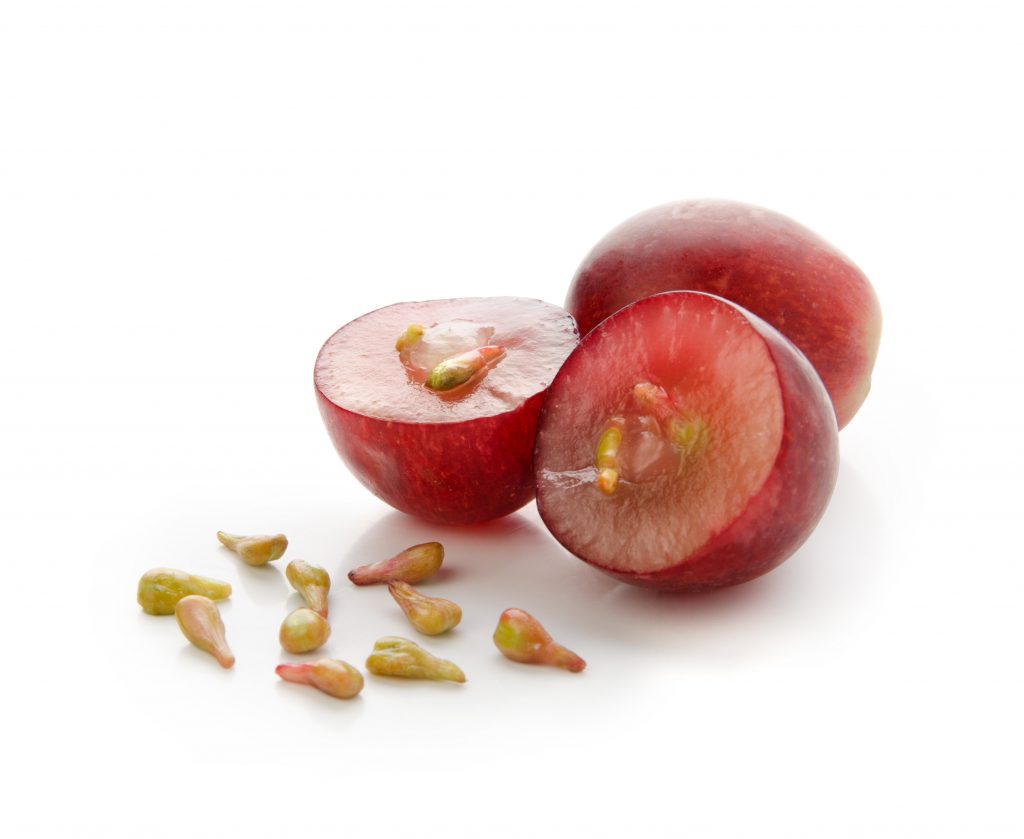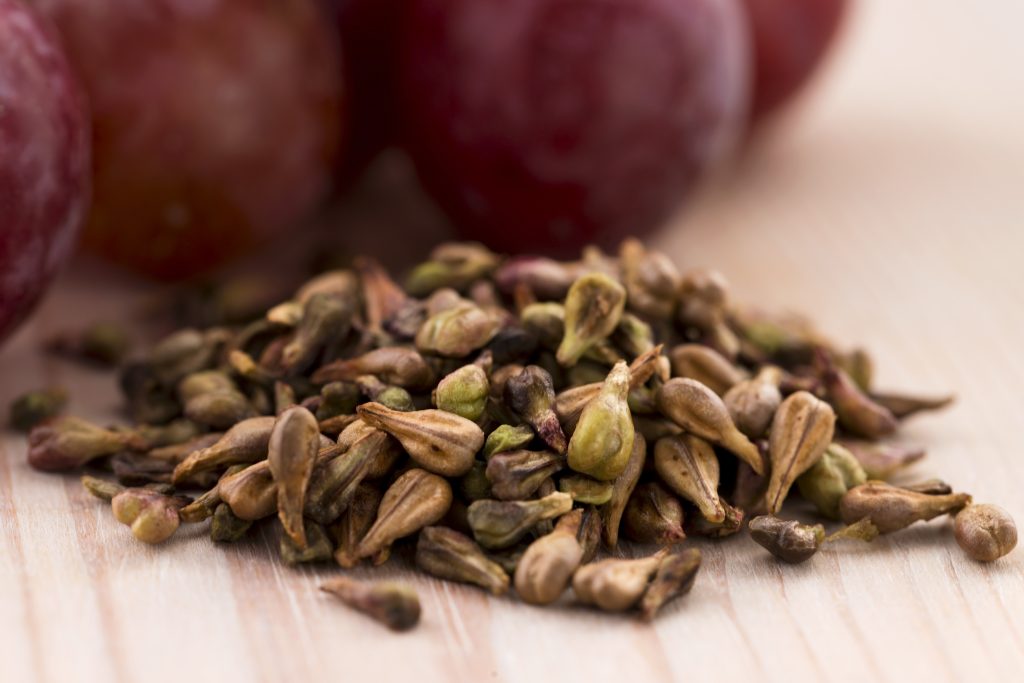Published on August 7, 2020. Last Updated on September 3, 2020.
Since the dawn of history, grapes have been consumed by humans across many different cultures, either as raw fruits or prepared as food products such as juice, jams and wine. The seeds themselves are normally discarded, since they are hard and have a bitter taste. Yet, since they are a rich source of antioxidants, they are now being processed as dietary supplements. Furthermore, research studies are now acknowledging the enormous benefits offered by grape seed extract for the hair and overall health.
 Grape seeds are a rich and abundant source of antioxidants
Grape seeds are a rich and abundant source of antioxidants
The Grape Seed – An Antioxidant Powerhouse
Grape seeds contain high concentrations of antioxidants due to the presence of compounds like phenolic acids, anthocyanins, flavenoids and oligomeric proanthocyanidin complexes (OPC’s). Antioxidants are molecules which neutralize and inhibit the destructive effects of free radical compounds (also known as reactive oxidative species) which contribute to the aging of our tissues and even our DNA. They originate from within our bodies as well as outside, environmental sources.
Antioxidants and Healthier Hair Growth
 Antioxidants may help fight premature aging processes in the body which can also affect and damage the hair follicles
Antioxidants may help fight premature aging processes in the body which can also affect and damage the hair follicles
As we get older, the production of antioxidants in our bodies declines, accelerating various aging processes. Our hair follicles are also affected by this oxidative stress.
In individuals with androgenic alopecia (i.e. common pattern baldness), researchers have found high levels of oxidative damage incurred by free radicals.
Researchers examined 27 patients suffering from androgenic alopecia, measuring specific byproducts as indicators of oxidative stress [1]. These included MDA, TEAC and thiol. Compared to normal controls, they noted greatly diminished antioxidant activity and higher levels of MDA within the blood plasma of these subjects which indicated heightened oxidative stress .
According to a publication by the International Journal of Trichology, our “endogenous defense mechanisms” against free radicals decreases [2]. These include our body’s own antioxidants in the form of enzymes and non-enzymes.
Without these defense mechanisms, we, of course, experience more oxidative stress and faster aging. Our hair follicles produce less hair in the form of alopecia. There is also a decline in the production of pigment producing cells called melanocytes, causing our hair to turn gray or white.
An increase in free radicals leads to greater oxidative stress. However, it is possible to counter this imbalance by increasing our dietary intake of antioxidants, with grape seed extract as an optimal choice.
What Research Has Discovered About How Grape Seed Extract Affects the Hair
 Studies are supporting the potential of compounds found within the grape seed to benefit the hair.
Studies are supporting the potential of compounds found within the grape seed to benefit the hair.
Within the ever-expanding availability of natural treatments, it is no secret that there are numerous claims being made about what can actually help improve hair quality and growth. Consumers must rely on their discernment to separate hype from more viable options to address their health and cosmetic concerns.
The information needed for making informed choices can be found in research studies and science-based literature.
There are several interesting studies which help support the beneficial effects of compounds found within grape seed extract on the hair.
In a notable South Korean study, male subjects with various levels of androgenic alopecia were asked to take pumpkin seed oil capsules [3]. A different type of seed extract was used. However, what pumpkin seed oil and grape seed extract both have in common are high concentrations of procyandin oligomers which may have been responsible for increasing the average hair count in this study by 40%.
Another important study performed on human subjects used a 1% concentration of procyandin B-2 tonic, derived from apples [4]. Topical applications resulted in significant hair growth after just 6 months. Researchers concluded that “Procyandin B-2 therapy shows potential as a safe and promising cure for male pattern baldness.”
The use of proanthocyanidins specifically extracted from grape seeds has been studied in mice [5]. A team of Japanese researchers was interested in finding out which plant extracts are capable of promoting hair growth activities. They studied about 1000 botanical derivatives and found that the proanthocyanidins from grape seeds produced the most impressive results.
First, the proliferation of hair follicle cells from mice (in vitro) increased by 230%. When used on mice in vivo, the proanthocyandins showed a remarkable ability to convert resting, non-growth telogen hair follicles to the active anagen (hair producing) phase.
Grape Seed Extract For Healthier Hair Follicles – Improving Blood Flow and Collagen
 Grape seed extract may promote improved blood flow and delay the aging of collagen in the body
Grape seed extract may promote improved blood flow and delay the aging of collagen in the body
Hair follicles rely on blood flow for oxygen and nutrition. Also since they are structurally made of collagen, the strength and health of this protein fiber matters for their overall functioning.
Medical researchers have learned that the high antioxidant concentrations found in grape seeds can actually improve blood circulation.
Supplements made from grape seed extract are used to help reduce the oxidation of LDL (bad cholesterol) which forms hardened fat deposits of plaque in the arteries.
In 17 postmenopausal women, 400mg of GSE achieved a blood-thinning effect, reducing the potential risk of blood clots.
In another study, 400mg of GSE was taken by a group of younger women after sitting for 6 hours during each trial. They experienced reduced swelling and edemas by 70% compared to the control group who did not take the supplements. These effects may have been achieved by minimizing oxidative stress, producing a strengthening effect of the blood vessels.
Research also suggests that grape seed extract may increase the resistance of collagen to the body’s own processes of degradation.
What does all this mean for our hair? Healthy blood flow and collagen are necessary for the longevity of the follicles and their ability to produce new hair shafts. And since the hair is virtually anatomically identical to the nails, the quality of our nails is also likely to benefit.
Beyond Hair – How Grape Seed Extract Benefits Your Overall Health
The high antioxidant content of grape seed extracts is not just limited to benefiting the hair, but also a wide range of other health areas. Here are few to consider.
Kidney
Did you know that our kidneys are highly susceptible to irreversible oxidative damage? In one study, 23 subjects with chronic renal failure took 2 grams of GSE every day for 6 months resulting in a 3% decrease in urinary protein and a 9% improvement in kidney filtration
Brain
Grape seed extract contains flavenoids with antioxidant and anti-inflammatory properties which may inhibit the formation of beta amyloid peptide fibrils, which contribute to degenerative diseases in the brain like Alzheimers. A study on 111 older adults who took regular GSE supplements showed improvements in memory, language and cognitive functioning.
Liver
In vivo studies on toxin exposure show that grape seed extract recycles antioxidants, reduces inflammation and protects against free radical damage with toxin exposure. A small study on humans revealed that GSE reduced levels of ALA (alanine amino transferase), an enzyme indicative of liver toxicity by 46%, while vitamin C produced no changes.
Cancer
Scientists have also found that the antioxidant activity of GSE may help against cancer. But additionally, some studies suggest that extract from the grape seed may also promote cancer-killing chemoactivity against malignant cells. Taking GSE supplements may help reduce the risk of cancer.
Infectious Growths
Grape seed extract also possesses antifungal and antibacterial properties. Supplements are commonly taken to treat candida, a yeast-like fungus. Studies also show that GSE can inhibit other types of bacteria responsible for food poisoning and abdominal upset.
Taking grape seed extract can optimize many aspects of your health including the functioning of your hair follicles. Regular food sources may not always provide sufficiently high levels of antioxidants that can really make a significant difference for our bodies. Surely, oral supplementation through natural products can help provide the amounts needed. However, by choosing more natural sources of antioxidants, like grape seed, we can improve the availability of antioxidant compounds for our cells and tissues.
Frequently Asked Questions – Grape Seed Extract for the Hair and Health
1. What does 95% grape seed extract mean? How is this beneficial?
The 95% usually refers to the concentration of procyanidins, formed from proanthocyanidins in the grape seed extract. These compounds are usually cited in research literature on GSE as the active treatment factor, due to their antioxidant benefits. However, the actual potency does not depend on the concentration, but rather the processing of the grape seeds.
2. What extraction methods for processing grape seeds are safe and will preserve the integrity of essential phytochemicals?
As with any natural botanical, heat should be omitted to prevent the destruction of important constituents. Thus, the use of alcohol as a solvent is the conventional means of extraction. Examples include acetone, methanol, acetonitrile and ethyl acetate. Newer innovations that are also being used include proton NMR spectroscopy and high performance liquid chromatography.
3. Does grapeseed extract have antiviral properties?
According to researchers, grapeseed extract may be effective against foodborne viruses such as feline calicivirus and murine norovirus as well as hepatitis. These viral types are different from the Coronavirus, which according to foodsafetynews.com does not transmit through foodborne routes.
Further Reading
References
[1] BE Prie,* L Iosif,* Oxidative stress in androgenetic alopecia, J Med Life. 2016 Jan-Mar; 9(1): 79–83.
[2] R. M. Trüeb, The impact of oxidative stress on hair, 17 November 2015
[3] Young Hye Cho , Sang Yeoup Lee et al., Effect of Pumpkin Seed Oil in Men With Androgentic Alopecia. Evid Based Complement Alternat Med. 2014;2014:549721. doi: 10.1155/2014/549721. Epub 2014 Apr 23
[4] A Kamimura 1, T Takahashi, Y Watanabe, Investigation of Topical Application of Procyanidin B-2 From Apple to Identify Its Potential Use as a Hair Growing Agent, Phytomedicin, 2000 Dec;7(6):529-36. doi: 10.1016/S0944-7113(00)80040-9
[5] T Takahashi , T Kamiya, Y Yokoo, Proanthocyanidins From Grape Seeds Promote Proliferation of Mouse Hair Follicle Cells in Vitro and Convert Hair Cycle in Vivo, Acta Derm Venereol, 1998 Nov;78(6):428-32. doi: 10.1080/000155598442719.
